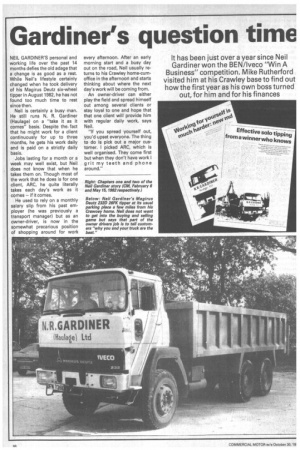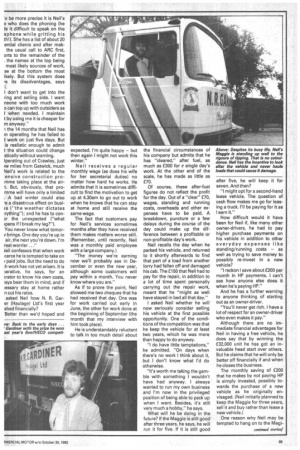Gardiner's question time
Page 52

Page 53

If you've noticed an error in this article please click here to report it so we can fix it.
NEIL GARDINER'S personal and working life over the past 14 months defies the old adage that a change is as good as a rest. While Neil's lifestyle certainly changed when he took delivery of his Magirus Deutz six-wheel tipper in August 1982, he has not found too much time to rest since then.
Neil is certainly a busy man. He still runs N. R. Gardiner (Haulage) on a "take it as it comes" basis. Despite the. fact that he might work for a client continuously for up to three months, he gets his work daily and is paid on a strictly daily basis.
Jobs lasting for a month or a week may well exist, but Neil does not know that when he takes them on. Though most of the work that he does is for one client, ARC, he quite literally takes each day's work as it comes — if it comes.
He used to rely on a monthly salary slip from his past employer (he was previously a transport manager) but as an owner-driver, is now in the somewhat precarious position of shopping around for work every afternoon. After an early morning start and a busy day out on the road, Neil usually returns to his Crawley home-cumoffice in the afternoon and starts thinking about where the next day's work will be coming from.
An owner-driver can either play the field and spread himself out among several clients or stay loyal to one and hope that that one client will provide him with regular daily work, says Neil.
"If you spread yourself out, you'd upset everyone. The thing to do is pick out a major customer. I picked ARC, which is well organised. They come first but when they don't have work I grit my teeth and phone around." I don't want to get into the ring and selling side. I want neone with too much work o can top up with outsiders as I When needed. I maintain t by using me it is cheaper for m anyway."
-1 the 14 months that Neil has in operating he has failed to I work on just five days. But is realistic enough to admit t the situation could change stically without warning.
lperating out of Crawley, just mr miles from Gatwick, much Neil's work is related to the :ensive construction promme taking place at the airt. But, obviously, that promme will have only a limited A bad winter could also re a disastrous effect on busi>s ("the weather dictates irything"); and he has to conar the unexpected ("what ipens if I break my leg?").
You never know what tomorv brings. One day you're up in air, the next you'rd down. I'm reat worrier ..."
led confesses that when work carce he is tempted to take on r paid jobs. But the need to do work has not yet arisen. It is aerative, he says, for an .4rator to know his own costs, rays bear them in mind, and if :essary stay at home rather n cut his rates.
asked Neil how N. R. Garer (Haulage) Ltd's first year shed financially?
'Better than we'd hoped and expected. I'm quite happy — but then again I might not work this winter."
Neil receives a regular monthly wage (as does his wife for her secretarial duties) no matter how hard he works, lie admits that it is sometimes difficult to find the motivation to get up at 4.30am to go out to work when he knows that he can stay at home and still receive the same wage.
The fact that customers pay for Neil's services sometimes months after they have received them makes matters worse still. (Remember, until recently, Neil was a monthly paid employee with a large company.) "The money we're earning now we'll probably see in December or even the new year, although some customers will pay within a month. You never know where you are."
As if to prove the point, Neil showed me two cheques that he had received that day. One was for work carried out early in June, the other for work done at the beginning of September (the month that my interview with him took place).
He is understandably reluctant to talk in too much detail about the financial circumstances of his company but admits that he has "cleared," after fuel, as much as £300 for a single day's work. At the other end of the scale, he has made as little as £70.
Of course, these after-fuel figures do not reflect the profit 'for the day. Out of a "clear" £70, wages, standing and running costs, overheads and other expenses have to be paid. A breakdown, puncture or a few delays during the course of the day could make up the difference between a profitable or non-profitable day's work.
Neil recalls the day when he parked his vehicle, and returned to it shortly afterwards to find that part of a load from another lorry had fallen off and damaged his cab. The £150 that Neil had to pay for the repair, in addition to a lot of time spent personally carrying out the repair work, meant that he "might as well have stayed in bed all that day."
I asked Neil whether he will • now seriously consider selling his vehicle at the first possible opportunity. One of the conditions of the competition was that he keep the vehicle for at least two years, which he was more than happy to do anyway.
"I do have little temptations," he admitted. "On days when there's no work I think about it, but. I don't know what I'd do otherwise.
"It's worth me taking the gamble with something I wouldn't have had anyway. I always wanted to run my own business and I'm now in the privileged position of being able to pack up when I want. Besides, it's still very much a hobby," he says.
What will he be doing in the future? If the Maggie is still good after three years, he says, he will run it for five. If it is still good after five, he will keep it for seven. And then?
"I might opt for a second-hand lease vehicle. The question of cash flow makes me go for leasing a truck. I'll be paying for it as I earn it."
How difficult would it have been for Ned if, like many other owner-drivers, he had to pay higher purchase payments on his vehicle in addition to other everyday expenses like standing/running costs — as well as trying to save money to possibly re-invest in a new vehicle?
"I reckon I save about £200 per month in HP payments. I can't see how anyone else does it when he's paying HP."
And he has a further warning to anyone thinking of starting out as an owner-driver.
"You'll never get rich. I have a lot of respect for an owner-driver who even makes it pay."
Although there are no immediate financial advantages for Neil in having a free vehicle, he does say that by winning the £32,000 unit he has got an invaluable head start over others. But he claims that he will only be better off financially if and when he closes the business.
The monthly saving of £200 that he makes by not paying HP is simply invested, possibly towards the purchase of a new vehicle as he originally envisaged. (Neil initially planned to .keep the Maggie for three years, sell it and buy rather than lease a new vehicle.)
One reason why Neil may be tempted to hang on to the Magi






































































